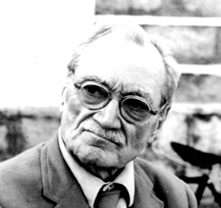John Grierson (1898-1972)
A True Scotsman
John Grierson, the son of a Scottish school teacher-pastor and a suffragette, maintained his puritan morality and social-democratic ideology throughout his entire life. When he was in his twenties, he travelled to the United States and admired the power of Hollywood in all its forms, from fiction to its reproduction of reality. A pioneering film critic, he invented the term “documentary film”.
Back in Great Britain, he became head of the film section of the General Post Office in London. It was in this capacity that he was invited to the country in 1938 by the Canadian government to propose improvements to government film production. Out of his suggestions was born the National Film Board/Office national du film in 1939, with Grierson at its helm.
A Social Vision of Cinema
Grierson saw cinema as an art form intended above all for the working classes. In keeping with European socialists of his day, he thought that art should challenge the past and offer new paradigms. For him, cinema could be a mirror of the present and contribute to greater awareness of the social conditions of working people, but above all it must be prophetic of a future in which the moral virtues of sharing will be more important than the creation of wealth. He did not hesitate to use the metaphor of the hammer—an element of the Soviet flag—to express his conception of cinema’s usefulness.
This vision of cinema would endure at the NFB for several decades, serving as both a stimulus and a restraint on the imagination of many filmmakers. Grierson spoke no French and had no real understanding of what was going on in Quebec. Nevertheless, he agreed to the creation of a “French unit” at the NFB, led by Vincent Paquette.
Exile
In 1945, Grierson was forced to resign for political reasons. He then worked in the United States and in his native Scotland.
- Themes
- 16 mm
- Native Peoples in the Cinema
- The Talkies Arrive
- Television
- French Canadians at the NFB
- Censorship
- Religious Cinema
- Settling the Land
- Film and French language
- Cinema and Religion
- 16mm Exhibition Circuits
- Quebec’s French Cousins in its Cinema
- Colour
- Film Distributors and Exhibitors
- Hollywood in Quebec
- Maria Chapdelaine
- Quebecers in Hollywood
- Radio and Cinema
- The Massey Report
- Film Magazines
- Second World War
- Organisations
- Biographies
- Juliette Béliveau
- Jean-Yves Bigras
- Léo Choquette
- Fifi D'Orsay
- René Delacroix
- J.A. DeSève
- George Ganetakos
- Pauline Garon
- Gratien Gélinas
- Nicole Germain
- John Grierson
- Paul Gury
- Richard Jarvis
- Paul L'Anglais
- Louis-Roger Lafleur
- Herménégilde Lavoie
- Ovila Légaré
- Guy Mauffette
- Joseph Morin
- Fedor Ozep
- Jean Palardy
- Vincent Paquette
- Jean-Marie Poitevin
- Maurice Proulx
- Roger Racine
- Norma Shearer
- Gordon Sparling
- Albert Tessier
To learn more
- Grierson. dir. : Roger Blais [National Film Board of Canada, 1974]
- Artisans profiles - National Film Board of Canada
- Canadian Encyclopedia
-
Gary Evans, John Grierson and the National Film Board: The Politics of Wartime Propaganda (Toronto: University of Toronto Press, 1984).
